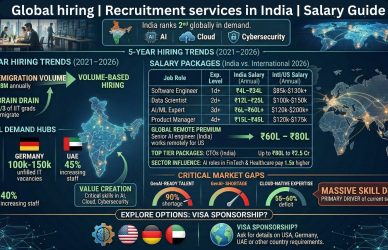
You may access talent from all over the world if you hire remote workers. This must indicate that you don’t need to spend as much time and energy on employer branding and recruitment marketing.
By making your brand more approachable, you may clear out unqualified candidates while attracting talent who shares your culture, values, mission, and vision. It is also beneficial for prospective employees to picture their experience with your business. Additionally, it forges a closer bond with your viewers. Give your brand a personality that is enticing, friendly, and nonetheless professional rather than starting with the stale corporate-professional language.
To be a remote-friendly business demonstrates your understanding of and support for work flexibility. Given that up to 97 per cent of workers want to work remotely in some capacity, you are in the lead when it comes to giving your staff the freedom they want.
Being a remote-friendly business, however, does not ensure that you will attract quality candidates for your open roles. You need to market your remote-friendly employer brand to make sure you’re bringing in the best remote talent to your team because so many people are looking for remote work and more businesses are adopting the concept.
Why does having a strong employer brand matter?
While related to your corporate brand, your employer brand is different from it. Your brand serves to differentiate you from the competitors in both situations. You can be recognized by your singular or distinctive “thing.” Although you might consider your brand in terms of your clients and consumers, that is only your business brand. What people believe it’s like to work for your organization is reflected in your employer’s brand. You stand out from other employers as a remote company for a variety of reasons, including your uniqueness. The way you position your Remote Staff hiring company in Delhi India friendly business will have an impact on how quickly and easily you fill your available positions, but in the wake of the pandemic, it’s not nearly as distinctive as it previously was.
How to market your brand as a remote friendly employer?
- Educate People.
Start by educating job searchers to assist them in determining whether your business is the best fit for them. Candidates will better comprehend the how and why of your remote work philosophy if you explain your decision-making process for choosing a remote model. Talk about the different types of remote work that your organization supports (results-only, work-from-anywhere, etc.) and explain why this is important to the business.
- All over the place, mention your remote work policy.
On every job posting and in every job description, make sure to make clear the nuances and details of your remote work policy. Inclusion of your remote work policy in each job posting demonstrates your support for Remote employee hiring consultants, Delhi-based Remote hiring firm in India work and ensures that applicants for open positions are aware of the types of remote work you do and do not offer.
- Post jobs on websites that are specifically for remote workers.
A fantastic strategy to promote your company as one that welcomes remote workers is to post job opportunities on job sites that appeal to them. It demonstrates your familiarity with remote employment and your knowledge of the requirements for a productive remote business.
Although you can state in your job ad that it is for a remote position on the major job boards, you are less likely to get applications from people who know what it takes to succeed as a remote worker. They might apply for the position because they think it would be interesting to work remotely or because it seems appealing.
People who frequently use job boards dedicated to Remote Staff hiring company in Delhi India employment are more likely to be interested in remote positions. These candidates are interested in working remotely and probably have the essential abilities to be successful remote employees, even though they still only apply for positions that sound intriguing and for which they are qualified.
- Become an advocate.
As a supporter of flexible employment, make your voice heard. Write about the remote work experience at your organization. To assist other businesses in understanding the benefits and difficulties of becoming remote, share what works and what doesn’t. Consider allowing staff members to blog about their experiences working remotely. Ask them to describe the benefits of remote work and the reasons they chose it. Encourage them to discuss the strategies they employ to be effective, productive, and able to maintain their attention. Sharing a little video on why they enjoy working with your firm and what makes it special. Advising on entering the field or describing how they responded to a job interview question. Creating a video series in which everyone discusses what each of the company’s basic values means to them and the various ways that the organization gives back.
- Make use of social media.
Engage with people in the Remote employee hiring consultants, Delhi-based Remote hiring firm in India work community on social media in addition to blogging for your organization. To distinguish your business as a remote-friendly organization, write engaging and informative social media postings. Commenters should be responded to and engaged with. After that, interact with people who publish articles regarding remote work by leaving comments on your own. Others will start to look to you and your firm as a pioneer in flexible work as you continue to share your knowledge about remote work.
- Ask for help
Examining what former and current employees post on social media is one method job searchers learn about a company’s brand. Encourage employees to discuss their remote work experiences on their profiles so that potential employees may get a better sense of what it’s like to work for your organization. Additionally, don’t be afraid of employees talking about bad experiences. Applicants may be more receptive to your firm’s assistance for its remote workers if they know the difficulties they have encountered and how your company has dealt with them.



